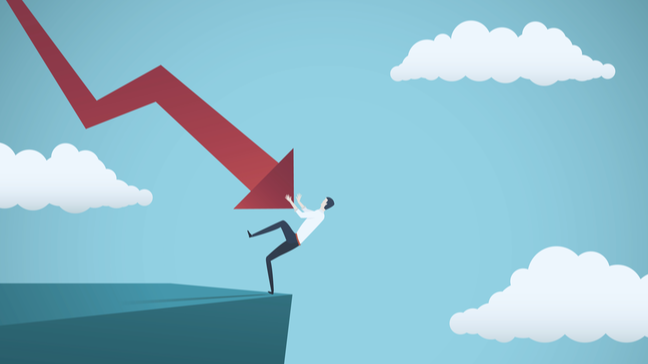It is likely that you have already experienced the effects of a recession. After all, from February to April 2020, the whole world experienced a huge financial downturn due to massive restrictions and economic inactivity caused by the COVID-19 pandemic.
Now, as inflation continues to skyrocket and the Federal Reserve tries to tame it, there is serious speculation that another recession is coming.
If all this talk is making you nervous, don’t worry.
In this article, we’ll cover everything you need to know about a recession, including whether we’re really headed for one and how to prepare yourself financially to weather the storm.
What is a recession?
The National Bureau of Economic Research, the organization responsible for determining whether we are in a recession or not, offers the following definition of a recession:
“a significant decline in economic activity that spreads throughout the economy and lasts for more than a few months.”
While most recessions are short-lived, one of the key factors signaling that they could start is a sharp decline in GDP for two consecutive quarters.
The term “GDP” means gross domestic product, which is a measure that tracks the rise or fall in the market value of goods and services produced by a country over a given period of time.
But what causes the fall in GDP?
Well… a combination of things, including:
- High inflation.
- High interest rates.
- Change in demand for goods and services.
High inflation forces people to cut their spending as everything becomes more expensive. Similarly, rising interest rates make credit more expensive, which is why many consumers, as well as businesses and government agencies, refrain from getting loans or applying for credit.
Budget cuts lead to a drop in demand for certain products and services (at least temporarily), so companies start cutting employee hours or laying off employees to stay afloat, which also slows down production. This, in turn, makes investors avoid investing in certain sectors.
The combined lack of spending, borrowing, trade, and investment shrinks the economy and causes GDP to fall.
Are we heading for another recession?
Back in April, Deutsche Bank was the first major financial institution to announce a possible recession. In its Prepare for a Hard Landing report, the banking giant predicts the US will enter a recession in 2023, citing high inflation and rising interest rates as key drivers.
Leon S. Labreque, executive vice president and head of planning strategy at Sequoia Financial Group, describes himself as a “recession student.” He agrees with Deutsche Bank’s forecast.
“We are getting warning signs like a 10-2 inversion. This time it is demand induced, not supply induced, but it is there nonetheless. The Fed is in a quandary that the real interest rate is still too low and has now become hawkish with further rate hikes,” says Labrecque.
“Given that the pandemic is possibly exacerbating supply chain disruptions and low unemployment is somewhat inflationary (to hire you need higher wages), I can expect a recession by early 2023,” he adds.
6 ways to protect yourself from a recession
While there is nothing you can do to stop a recession from knocking on your door, there are a few things you can do to protect your finances in case it comes our way collectively.
Check your budget
Labrec says the key to developing a good financial strategy to get through any recession is asking, “What is your cash flow? Good, bad or ugly? What if your income drops by 20% or 40%?”
Recessions are often accompanied by high unemployment. The COVID-19 recession caused 114 million job losses globally, even though it only lasted about two months, according to the International Labor Organization.
Now is the time to assess whether you can afford your fixed costs, such as rent, utilities, groceries, and minimum debt payments, in case your income drops significantly.
If you’re in the habit of increasing your budget every month, look for opportunities to cut any unnecessary expenses.
This includes: getting rid of subscriptions you don’t need or rarely use, switching to a cheaper mobile phone plan, and evaluating your insurance coverage if you haven’t made any changes to your policy in years. This way, you will have room to maneuver in your budget if things go wrong.
Connected: How to Budget: Our Step by Step Guide to Managing Your Money
Increase your reserve fund
“Always have three to six months of cash in reserve,” says Kirsten Crane Cadden, CFP and Associate Advisor at Warren Street Wealth Advisors.
“If you are in a high turnover industry or one that is prone to layoffs or layoffs during times of economic turmoil, consider leaning towards a fund that can cover at least six months or up to one year of necessary expenses,” she adds. .
While this may be easier said than done, especially when you have many bills to pay, such as student loans, rent, or mortgages and insurance, it’s important that you try to maximize your reserve fund. That way, you’ll have a cushion to lean on if you suddenly find yourself unemployed or working fewer hours than usual.
Connected: Reserve funds: everything you need to know
Manage investor anxiety
The stock market can fluctuate wildly during a recession, which can make anyone nervous, especially if that’s what all your retirement money is invested in.
However, Jessica Goedtel, CFP and founder of Pavilion Financial Planning, advises against adjusting your portfolio in anticipation of a recession.
“Before you make changes to your 401(k) investments, think about the big picture. The average recession lasts 1.5 years, which is just a blip on the radar if you have more than 25 years before retirement,” Gödtel says.
“If you are trying to sell profits before the market drops, remember that it is almost impossible to time the market. Even if you do it right, you still have to decide when to get back into the market. Too often people make mistakes when they would be better off sticking to their current strategy,” she adds.
If you’re not sure if you have a well-balanced portfolio that can handle the ups and downs of the market, your best bet is to get someone you trust – either a CFP or an investment advisor – to take a look at it so they can make any necessary adjustments.
Otherwise, making rash investment decisions based on fear can lead to long-term losses and lower retirement savings.
Read more: When is the right time to hire a financial advisor?
Live within your means
Do you have a tendency to use a credit card for purchases even if you don’t have the cash to pay it off later? If so, a recession is the right time to do some financial soul-searching and finally change this habit.
Read more: How to use a credit card responsibly
One way banks and other financial institutions try to protect themselves and their assets during a recession is by imposing “credit limits.” If you’ve never heard the term before, it basically means that banks will tighten their lending requirements. Thus, you will only get access to a loan if you can prove that you are an excellent borrower.
The last thing you want during a recession is to be knee-deep in unnecessary debt, as this can hurt your chances of getting approved for more important financial milestones like home or car loans.
Generally speaking, before a recession, it’s a good idea to aggressively reduce any high-interest debt you have (such as credit card debt). If your income is going down, you don’t want to be in a position where you can’t make the minimum payments you owe.
If you currently have credit card debt, consider paying it off with a personal loan, as you are likely to get a lower interest rate on your loan than paying on a credit card. Alternatively, you can check to see if you are eligible for a balance transfer credit card that will allow you to transfer your credit card debt to a new card with a low interest rate (preferably 0%) over a year or more.
Consider source(s) of income
During the COVID-19 recession, retail, restaurants, hospitality, entertainment, manufacturing, travel and leisure were among the hardest hit, while other industries such as healthcare and technology flourished.
If you work in an industry where layoffs or layoffs are common during economic downturns, it might be time to see if you can do the same job in another, more resilient industry.
Likewise, this might be the perfect time to finally take on a part-time job. That way, if something goes wrong with your day job, you’ll have another source of income to keep you going until things improve.
Connected: Ideas for a side job
Do not panic
Okay, you’re probably thinking, “What? How can I not panic if my financial security is at stake?” But listen to me.
Recessions are bad news, yes. But they are also temporary. Sometimes they can be very short. For example, the COVID-19 recession lasted only about two months, while the Great Recession, considered one of the longest in US history, lasted 18 months. So even if things get better for a while, it won’t last forever.
Summary
Recessions cannot be avoided, but that doesn’t mean you can’t protect yourself from them. While some of the strategies listed above may be harder to implement than others, they are all worth at least a try as they can make a big difference when things go wrong.


